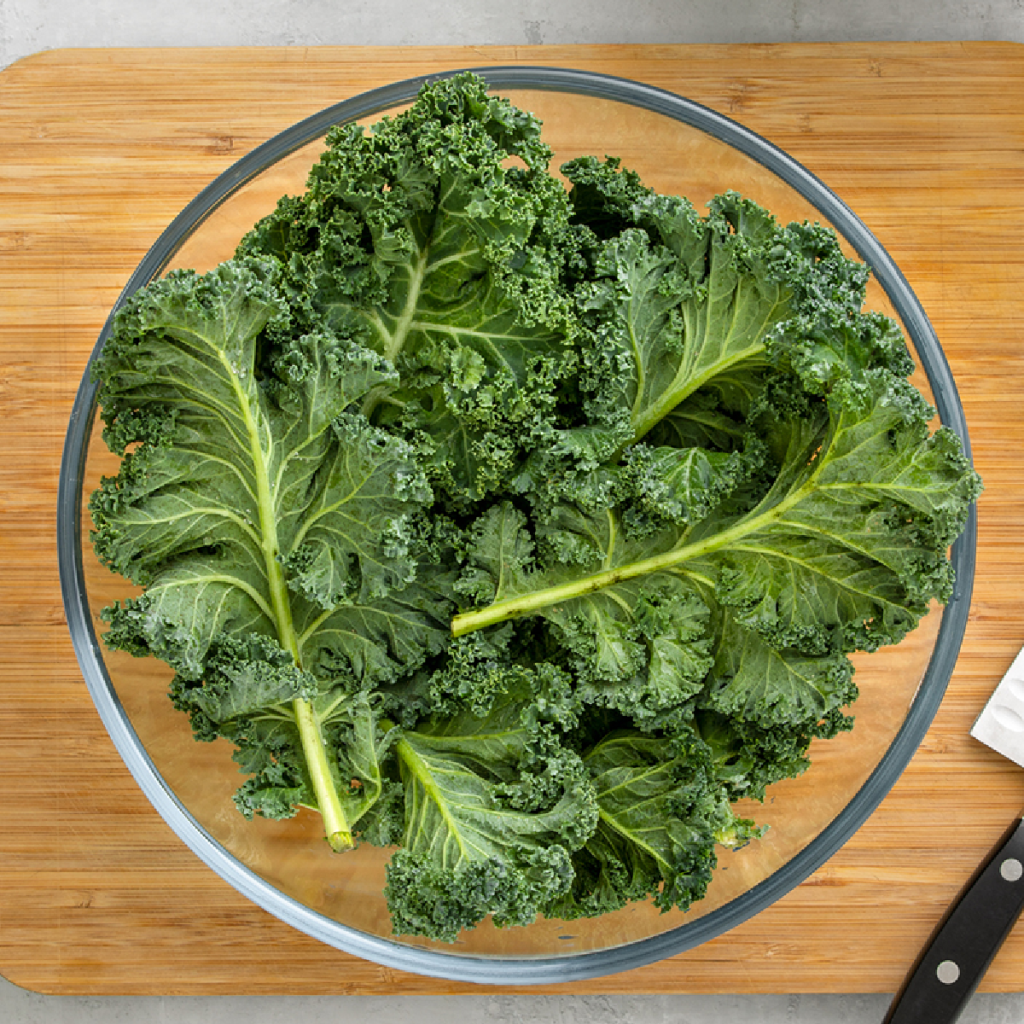Learn about the numerous benefits of incorporating kale into your diet.
Discover the Benefits of Kale in Your Diet
Have you heard of the trendy leafy green called kale? It’s not just for health enthusiasts and hipsters anymore – kale is now making its way into the mainstream. And for good reason! Kale is packed with an array of incredible benefits that can boost your overall health and well-being. So let’s dive right in and explore the wonders of kale!

Understanding the Nutritional Profile of Kale
Before we delve into the specific benefits, let’s take a closer look at the nutritional profile of this powerhouse veggie. Kale is a true superfood, loaded with vitamins, minerals, and antioxidants that can do wonders for your body.
Kale, scientifically known as Brassica oleracea, belongs to the cruciferous vegetable family, which also includes broccoli, cauliflower, and Brussels sprouts. It is a leafy green vegetable that has been cultivated for centuries and is renowned for its nutritional value.
Vitamins and Minerals in Kale
Kale is bursting with vitamins A, C, and K – essential nutrients that support various bodily functions. Vitamin A is crucial for maintaining healthy vision, promoting cell growth, and supporting the immune system. Vitamin C is a powerful antioxidant that boosts the immune system, promotes collagen production, and aids in iron absorption. Vitamin K plays a vital role in blood clotting, bone health, and cardiovascular health.
Additionally, kale contains minerals like calcium, magnesium, and potassium, which are crucial for maintaining optimal health. Calcium is essential for strong bones and teeth, while magnesium plays a role in muscle and nerve function. Potassium helps regulate blood pressure, fluid balance, and muscle contractions.
Fiber and Protein Content in Kale
Not only is kale packed with vitamins and minerals, but it’s also an excellent source of fiber and protein. Fiber aids in digestion and promotes a healthy gut. It adds bulk to the stool, preventing constipation, and helps maintain bowel regularity. Additionally, fiber can help control blood sugar levels and lower cholesterol levels.
Protein is essential for building and repairing tissues. It is made up of amino acids, which are the building blocks of life. Protein plays a crucial role in muscle development, immune function, and hormone production. While kale is not as high in protein as animal-based sources, it is still a valuable plant-based protein option.
Moreover, kale contains a variety of other beneficial compounds, such as antioxidants and phytochemicals. These compounds help protect the body against oxidative stress, inflammation, and chronic diseases like cancer and heart disease.
So, next time you enjoy a kale salad or add kale to your smoothie, remember that you are fueling your body with an abundance of vitamins, minerals, fiber, and protein. Embrace the nutritional power of kale and reap its numerous health benefits!
The Role of Kale in Weight Management
If you’re looking to shed a few pounds, kale can be your ultimate ally. Its unique properties make it an ideal addition to your weight loss journey.
Kale, a leafy green vegetable, has gained popularity in recent years due to its numerous health benefits. Not only is it delicious and versatile, but it also offers a range of advantages when it comes to weight management.
Low Calorie Count and High Nutrient Density
One of the key reasons kale is a favorite among health-conscious individuals is its low calorie count. In fact, a cup of raw kale contains only about 33 calories, making it an excellent choice for those who are watching their calorie intake. You can enjoy a generous serving of kale without worrying about adding extra inches to your waistline.
But that’s not all – kale is also packed with essential nutrients. It is rich in vitamins A, C, and K, as well as minerals like calcium and potassium. These nutrients are vital for maintaining overall health and well-being. By incorporating kale into your diet, you can ensure that you’re getting all the necessary vitamins and minerals while keeping your calorie intake in check.
The Satiety Factor of Kale
Ever wonder why kale leaves you feeling satisfied and full? Thanks to its high fiber and water content, kale can keep hunger pangs at bay. Fiber is known to promote feelings of fullness, as it takes longer to digest and helps regulate blood sugar levels. This means that incorporating kale into your meals can help you stay satisfied for longer periods, reducing the urge for mindless snacking.
Furthermore, the water content in kale adds to its satiety factor. Water is essential for maintaining hydration and promoting a healthy metabolism. By consuming kale, you’re not only benefiting from its nutritional value but also ensuring that your body stays hydrated throughout the day.
Additionally, kale is low in carbohydrates, making it an excellent choice for those following a low-carb or ketogenic diet. Its low glycemic index prevents sudden spikes in blood sugar levels, which can lead to cravings and overeating.
So, say goodbye to mindless snacking and hello to a satiated tummy! Incorporating kale into your meals can help you manage your weight effectively while providing your body with essential nutrients.
Kale and Heart Health
Your heart is the most vital organ in your body, and taking care of it should be a top priority. Luckily, kale has some amazing cardiovascular benefits that can keep your ticker ticking happily.
Kale, also known as the “queen of greens,” is a nutrient-dense leafy green vegetable that belongs to the Brassica family, which includes broccoli, cabbage, and Brussels sprouts. It is packed with essential vitamins, minerals, and antioxidants that contribute to overall heart health.
One of the key ways kale supports heart health is by helping to lower cholesterol levels. Did you know that kale contains compounds that can help lower your cholesterol levels? Its abundance of soluble fiber helps remove excess cholesterol from your bloodstream, reducing the risk of heart disease. Soluble fiber acts like a sponge, binding to cholesterol and preventing its absorption into the bloodstream. So, let kale be your heart’s best friend!
In addition to its cholesterol-lowering properties, kale also plays a crucial role in blood pressure regulation. High blood pressure, also known as hypertension, is a silent killer that significantly increases the risk of heart disease and stroke. However, kale can come to the rescue. Thanks to its potassium content, kale promotes healthy blood pressure levels and reduces the risk of hypertension. Potassium is an essential mineral that helps relax blood vessels, allowing blood to flow more freely and reducing strain on the cardiovascular system. It’s time to add some kale power to your heart’s arsenal!
Furthermore, kale is a rich source of antioxidants, such as vitamin C, vitamin E, and beta-carotene. These antioxidants help protect the heart from oxidative stress and inflammation, which are key contributors to the development of heart disease. By neutralizing harmful free radicals and reducing inflammation, kale helps maintain the health and integrity of the blood vessels, ensuring optimal blood flow to the heart.
Not only is kale beneficial for heart health, but it also supports overall well-being. Its high fiber content promotes healthy digestion and aids in weight management, both of which are important factors in maintaining a healthy heart. Additionally, kale is a low-calorie vegetable, making it an excellent choice for those looking to shed a few pounds without compromising on nutrition.
When it comes to incorporating kale into your diet, the possibilities are endless. You can enjoy it raw in salads, sauté it with garlic and olive oil, or blend it into smoothies for a nutrient-packed boost. Remember to choose organic kale whenever possible to minimize exposure to pesticides and maximize its nutritional value.
In conclusion, kale is a true heart-healthy superfood. Its cholesterol-lowering, blood pressure-regulating, and antioxidant-rich properties make it an excellent addition to any diet aimed at promoting cardiovascular health. So, why not give your heart some love and embrace the power of kale?
The Impact of Kale on Digestive Health
A happy and healthy gut is the key to overall well-being. Luckily, kale can do wonders for your digestive system!
But what exactly makes kale so beneficial for your gut? Let’s dive deeper into the role of fiber and prebiotics in digestion.
The Role of Fiber in Digestion
Kale’s high fiber content keeps your digestive system running smoothly. Fiber is an indigestible carbohydrate that adds bulk to your stool, promoting regular bowel movements and preventing constipation. It acts like a broom, sweeping away waste and toxins from your body.
Not only does fiber aid in digestion, but it also helps regulate blood sugar levels and lowers cholesterol. By slowing down the absorption of sugar and fats, fiber contributes to a healthier cardiovascular system.
So, no more uncomfortable tummy troubles! Incorporating kale into your diet can provide you with the fiber your body needs for optimal digestive health.
How Kale Promotes Gut Health
In addition to its fiber content, kale is also rich in prebiotics. Prebiotics are a type of dietary fiber that serves as food for the beneficial bacteria in your gut.
But why is nourishing your gut bacteria so important? Well, your gut is home to trillions of bacteria, collectively known as the gut microbiome. These bacteria play a crucial role in various aspects of your health, including nutrient absorption, immune function, and even mental well-being.
When you consume prebiotics from kale, you’re essentially providing fuel for the good bacteria in your gut. This helps them thrive and multiply, creating a diverse and balanced gut microbiome.
A healthy gut microbiome is essential for proper digestion and nutrient absorption. It helps break down complex carbohydrates, produce vitamins, and protect against harmful pathogens.
Furthermore, a balanced gut microbiome has been linked to a reduced risk of various digestive disorders, such as inflammatory bowel disease, irritable bowel syndrome, and colon cancer.
So, let kale work its magic and keep your gut happy! By incorporating this leafy green into your diet, you can support a healthy gut microbiome and enjoy improved digestion and overall well-being.
Kale and Eye Health
They say eyes are the windows to the soul, so it’s crucial to take care of them. And kale can be your knight in shining armor when it comes to eye health!

The Importance of Lutein and Zeaxanthin
Kale contains two powerful antioxidants, lutein and zeaxanthin, which are known to promote healthy vision. These antioxidants protect your eyes from harmful blue light and reduce the risk of age-related macular degeneration. So, say hello to kale and wave goodbye to blurry vision!
Vitamin A in Kale and Its Benefits for Eyes
Last but not least, kale is loaded with vitamin A, a nutrient crucial for maintaining good eyesight. Vitamin A plays a vital role in preventing night blindness and keeping your peepers healthy. It’s time to give your eyes the kale they deserve!
So, there you have it – the incredible benefits of kale in a nutshell. From its impressive nutritional profile to its various health-promoting properties, kale is truly a superstar in the world of leafy greens. So, why not incorporate this versatile veggie into your diet and reap all the amazing rewards? Your body will thank you, and your taste buds might just become kale enthusiasts too!







